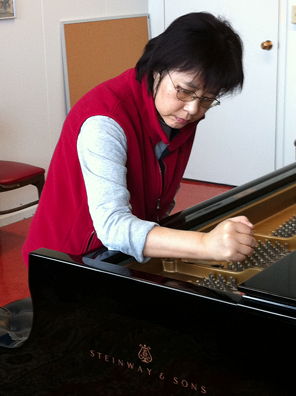Piano Care
The beautiful, natural sound of a piano is due to the remarkable blending of such materials as wood, metal, buckskin, and wool. Together they create a uniquely timeless sound that no other instrument in the world can duplicate.
As you might expect with any investment of this size and complexity, a piano requires periodic servicing to provide outstanding performance year after year. Regular servicing by a qualified technician will preserve the instrument and help avoid costly repairs in the future.
How often should a piano be serviced?
Every piano requires a different level of maintenance, depending upon the quality of materials used and the design and level of craftsmanship. Manufacturers provide general advice, but Excel Piano can give specific recommendations based upon your usage and locale.
The three components of musical performance that need to be adjusted periodically are:
-
pitch, adjusted by tuning
Tuning is the adjustment of the tuning pins so that all the strings are of the proper tension (pitch), to have the correct sounding, musical intervals. Major piano manufacturers generally recommend tuning a new piano four times in its first year, and twice per year thereafter.
-
tone, adjusted by voicing
In voicing, the technician modifies the shape and hardness of each hammer to make the piano's sound as beautiful and consistent as possible. A home piano may need some initial voicing to customize it to the owner's taste, then every few years to maintain its tone.
-
touch, adjusted by regulation
The piano action is an intricate system of levers, springs, and hammers connected to the keyboard. When a piano leaves the factory, each of its parts is adjusted to a tolerance of a few thousandths of an inch. This process is called regulation. Because the wood and felt parts of the action may change dimension due to humidity and wear, the action should be regulated every few years to maintain its responsive qualities. You and Excel Piano together should decide how frequently your piano needs regulation. The intensity and number of hours the instrument is played, climatic conditions, and the quality of the instrument itself are all factors.
How does humidity affect a piano?
Extreme swings from hot to cold or dry to wet are harmful to your piano. Dryness causes the piano's pitch to go flat; moisture makes it go sharp. Repeated swings in relative humidity can cause soundboards to crack or distort. Extreme dryness also can weaken the glue joints that hold the soundboard and other wood portions of the piano together. Moisture may lead to string rust. A piano functions best under fairly consistent conditions which are neither too wet or dry, optimally at a temperature of 68 degrees F and 42 percent relative humidity.
Using an air conditioner in humid summer months and adding a humidifier to your central heating system will reduce the extremes of high and low humidity. Room humidifiers and dehumidifiers, as well as a system like the Piano Life Saver installed inside the piano, will control humidity-related disorders still further.

